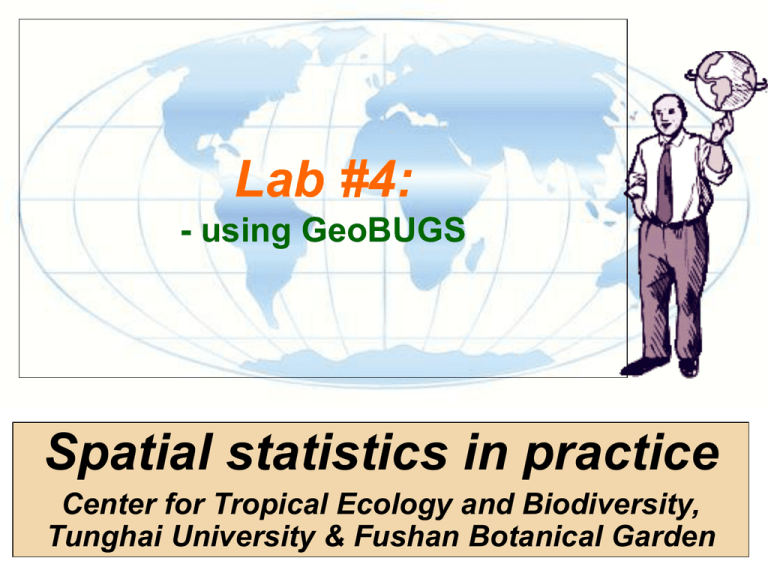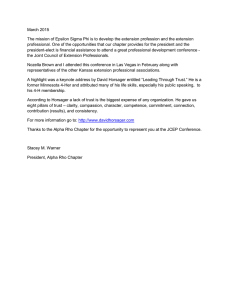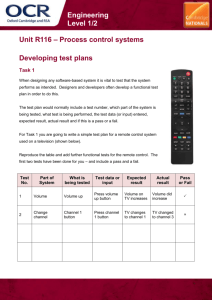Lab #4: Spatial statistics in practice - using GeoBUGS
advertisement

Lab #4:
- using GeoBUGS
Spatial statistics in practice
Center for Tropical Ecology and Biodiversity,
Tunghai University & Fushan Botanical Garden
Converting Arc shapefiles to
GeoBUGS maps
1. Open ArcMap
2. Use Conversion Tools to covert the
shapefile “to coverage”
3. Use Coverage tool “from coverage” to
ungenerate (*** in version #9)
1. Choose “coverage generated” “feature
type”
2. Choose “fixed” “numeric format”
3. Use the .txt extension for the output file
4. Edit the ASCII output file by inserting
1. map:n
number of areal units
2. Add Xscale: ***
not optional
Yscale: ***
1. Consecutive integers 1, 2, …, n assignment to
areal unit alphanumeric names (one areal unit per
record line)
2. regions
ArcMap number assignment to areal unit
alphanumeric names (one areal unit per record
line)
END
5. Open a new window in WinBUGS & paste the
edited output file from ArcMAP
6. Open the MAP pulldown menu and select
“import ARCINFO”
Puerto Rico example map
n
map:76
Xscale: 69.1
Yscale: 65.7
1
2
3
4
5
6
7
8
9
10
11
.
.
.
67
68
69
70
71
72
73
74
75
76
scale
Isabela
Aguadilla
Arecibo
Vega_Baja
Hatillo
Camuy
Quebradillas
Barceloneta
Vega_Alta
Manati
Dorado
consecutive integers
with names
Penuelas
Yabucoa
Patillas
Guayama
Salinas
Lajas
Maunabo
Santa_Isabel
Arroyo
Guanica
regions
1 Isabela
2 Aguadilla
3 Arecibo
4 Vega_Baja
5 Hatillo
6 Camuy
7 Quebradillas
8 Barceloneta
9 Vega_Alta
10 Manati
11 Dorado
ArcInfo sequence
.
.
of integers
.
with names
64 Juana_Diaz
65 Sabana_Grande
66 Guayanilla
67 Penuelas
68 Yabucoa
69 Patillas
70 Guayama
71 Salinas
72 Lajas
73 Maunabo
74 Santa_Isabel
75 Arroyo
76 Guanica
END
1
-66.957328796537695 18.489151001160103
-66.952575683427725
-66.953041076730273
-66.962738037179861
-66.963653564340419
-66.958953857184653
-66.963493347318519
-66.966682434196983
-66.958244323698267
-66.949417114597665
-66.947563171530049
-66.947090148925568
-66.943260193118775
-66.941383362145373
-66.935333251734193
-66.934387207365916
-66.934379577223297
-66.934829711921992
-66.939422607169362
-66.941734314237607
-66.944046020465152
-66.945884704928901
-66.947257995249402
-66.948158263806107
-66.947212219437830
-66.942550658791703
-66.940231323262225
-66.931427002067423
-66.926795959469700
-66.924484253242156
-66.923553466637031
-66.922622680872607
-66.922142028966192
-66.922119140219706
-66.929054260583740
-66.930900573508723
-66.935035705596164
-66.935485839454174
-66.937316894616004
-66.937286376567585
-66.937278747265651
-66.936798095359237
-66.936775207453451
-66.945564270044400
-66.948814392178988
-66.959526062395611
-66.973922729160265
-66.979484558363112
-66.984558105516896
-66.985023498819459
-66.992004394154364
-66.997589111262997
-67.002243041766505
-67.005958557203655
-67.027252196982005
-67.050949096292442
-67.052383422709767
-67.053825378429025
-67.056228637961112
-67.056312561123022
-67.057701110888075
-67.058631896652500
-67.059181213116986
-67.062973022414127
-67.073211670026254
-67.079238891690949
-67.079696655691578
-67.082496643127470
-67.082984924335818
-67.082565307685542
-67.085388183867906
-67.091926574646749
-67.095703125340037
-67.097595214917291
-67.108276367085494
-67.101333618260227
-67.097625732125010
-67.090682983299743
-67.053573608102568
-67.045684814068323
-67.043823242539489
-67.036849975665803
-67.029884338094064
-67.027099609262024
-67.021530151597958
-67.013160705657299
-67.005241394415336
-66.977287292505196
18.477293014667296
18.476812362760878
18.473377228162935
18.471937179979335
18.465316772733544
18.455747604562497
18.449995041130034
18.440557479468140
18.438266754451419
18.437808990450790
18.436859131011197
18.424034118939282
18.421670913452495
18.418399810947768
18.417457580810105
18.416503906299198
18.415544510022020
18.410736084262879
18.409759521846183
18.409736633099701
18.408287048078517
18.406368255524157
18.403499603530204
18.401601791345978
18.399269103907603
18.399291991813392
18.398427963071374
18.398473739723645
18.398496627629434
18.398506164467019
18.398038864469498
18.396614074889758
18.393280029593246
18.392734527359387
18.391763687549659
18.388387679831492
18.387426376018659
18.384548187187118
18.381690978725711
18.381214141890606
18.379312515475760
18.376930237154500
18.375411987575255
18.376808166642238
18.381938933980852
18.386077881139602
18.386493682718580
18.385011672954022
18.385482788022856
18.388744354530690
18.391065597595823
18.392923354894052
18.394309997964143
18.393598556101406
18.443834304579834
18.447631835643250
18.452852248750748
18.460924148553378
18.468544006121654
18.468528747517794
18.468517303144555
18.476133346482211
18.484186172609672
18.487878799300344
18.487810134742283
18.487802505440353
18.489200592042991
18.491100310922182
18.495391845800910
18.499166488958537
18.503376007370314
18.509048461871473
18.512357711726541
18.514137268469817
18.515171051071331
18.515689849487398
18.516252517860771
18.515251160002631
18.514390945491229
18.514408111630743
18.512582779075888
18.511707305960627
18.511262893868896
18.510374068844737
18.508560180663125
18.504835128388386
18.491323470735875
concatenated
digitized
boundaries
-66.957328796537695 18.489151001160103
END
.
.
.
END
File entries
• The boundaries file generated by ArcGIS
has areal units in the same order as appears
in the *.shp attribute file (i.e., the *.dbf file)
• The order of the data included in the
GeoBUGS files must be the same as this
order
• The names should be in alphabetical order;
WinBUGS checks that the pairs of alphanumeric names are exactly the same
• REMINDER: WinBUGS default is the
queen’s definition of adjacency
Data entries
• Each variable needs to be extracted from the
ArcView/ArcGIS *.dbf file, inserted into
MSWord, and then converted to a sequence
of values (with line breaks) that are commadelimited.
• The MSWord replacement (use global
search and replace) command for paragraph
is ^p, which needs to be replace with a
space followed by a comma
Model syntax
• The model (e.g., binomial probability,
Poisson log-mean) needs to be specified
• The prior distribution for each parameter,
including its variance, needs to be specified:
dflat() should be used for an intercept term
• The empirical variable values need to be
included
• A random effects MAY be included
• Initial values should be posited
• Spatial autocorrelation can be included via a
CAR model, an ICAR model, or a SF model
GeoBUGS execution instructions
• Step 1: open a new window in WinBUGS (this
will be referred to as the user window)
• Step 2: enter the model syntax, data, and initial
values, using the WinBUGS format, in the user
window
• Step 3: select “Specification” in the “Model”
pull down window
• Step 4: highlight “model” in the user window,
appearing at the beginning of the model syntax,
and click once on the “check model” button in
the “Specification Tool” window
NOTE: feedback from the program appears in
the lower left-hand corner of the WinBUGS
program window, and should be monitored
• Step 5: highlight “list” in the user window,
appearing at the beginning of the data, and click
once on the “load data” button in the
“Specification Tool” window
• Step 6: insert the number of chains to be run
(the default number is 1) in the “Specification
Tool” window
• Step 7: click once on the “compile” button in the
“Specification Tool” window
• Step 8: highlight “list” in the user window,
appearing at the beginning of the initial values,
and click once on the “load inits” button in the
“Specification Tool” window (one set is needed
for each chain to be run; clicking the “gen inits”
button can be dangerous for sound analysis)
• Step 9: close the “Specification Tool” window
• Step 10: select “Samples” in the “Inference” pull
down menu
• Step 11: in the “Sample Monitor Tool” window: type
in the name (as it appears in the model syntax) of the
1st parameter to be monitored, and click once on the
“set” button; type in the name of the 2nd parameter to
be monitored, and click once on the “set” button; …;
type in the name of the pth parameter to be monitored,
and click once on the “set” button
• Step 12: close the “Sample Monitor Tool” window
• Step 13: select “Update” in the “Model” pull down
menu
• Step 14: the default value in the “updates” box is
1000 this value most likely will need to be
substantially increased (say, to 25,000 first for burn-in,
and then 500,000 for MCMC; once any desired
changes are made, click once on the “updates” button
• Step 15: once the number appearing in the
“iteration” box equals the number in the
“updates” box, close the “Update Tool” window
• Step 16: select “Samples” in the “Inference”
pull down menu
• Step 17: click on the down arrow to the right of
the “node” box, and select the parameter to be
monitored
• Step 18: the burn-in period (say, 10,000) should
be specified, as should the weeding (say, 100);
click once of the “history” button to view the
time-series plot for all iterations; click once on
the “auto cor” button to view the time-series
correlogram (you may wish to enlarge the
graphic in this window); click once on the “stats”
button to view a parameter estimate’s statistics
• Step 19: close the “Sample Monitor Tool” window
• Step 20: select “Mapping Tool” from the “Map” pull down
menu
• Step 21: select the appropriate map from the list
appearing for the “Map” box when the down arrow to its
right is clicked once (hint: your map that you imported
from an Arc shapefile should appear here)
• Step 22: type the name of the variable (exactly as it
appears in the model syntax) to be mapped in the
“variable” box, and click once on the “plot” box
• NOTE: Possible mappings for the Scottish lip cancer data
include
1.
2.
3.
4.
5.
b – area-specific random effects term
mu – area-specific means
RR – area-specific relative risks
O – observed values
E – expected values
Sample model syntax: example #1
#MODEL
model
{
for (i in 1 : N) {
U[i] ~ dbin(p[i], T[i])
p[i] <- exp(alpha)/(1+exp(alpha ))
}
# Other priors:
alpha ~ dflat()
}
#DATA
list(N = 73,
U = c(11062, 42042, 64685, 27305, 23077, 25387, 91593, 18346, 32281, 27850, 254115,
40875, 139445, 30886, 185703, 43707, 16671, 14262, 40457, 29802, 16800, 35270,
33421, 39958, 20682, 40395, 21087, 99850, 35476, 36201, 16472, 58848, 42527, 11048,
46236, 35859, 21330, 25584, 3792, 32126, 74856, 18664, 41997, 2839, 11787, 95880,
37713, 27605, 21499, 29709, 17200, 14688, 23829, 178792, 24196, 14767, 50242,
23848, 28462, 34650, 434374, 35130, 38583, 17412, 63929, 94085, 75728, 23852,
36971, 59572, 23364, 37238, 40919
),
T = c(19143, 42042, 64685, 29032, 26493, 28348, 100131, 19117, 34689, 28909, 254115,
46911, 140502, 35244, 186076, 47370, 18004, 19811, 42753, 37597, 20002, 36867,
34017, 40712, 21888, 44301, 23072, 100053, 36743, 38925, 16614, 59035, 44444,
17318, 50531, 36452, 26261, 34415, 11061, 34485, 75872, 19817, 45409, 6449, 12741,
98434, 39697, 29965, 23753, 29709, 23844, 20152, 26719, 186475, 25450, 14767,
52362, 25935, 31113, 37105, 434374, 40997, 44204, 21665, 63929, 94085, 75728,
35336, 37910, 61929, 27913, 39246, 46384
),
)
#INITIAL VALUES
list(alpha=-3)
Sample model syntax: example #2
#MODEL
model
{
for (i in 1 : N) {
U[i] ~ dbin(p[i], T[i])
p[i] <- 1/(1+exp(alpha + b*SF[i] + S[i]))
S[i] ~ dnorm(0,0.0001)
}
# Other priors:
alpha ~ dflat()
b ~ dnorm(1,precb)
precb ~ dgamma(0.5,0.0005)
sigmab <- sqrt(1/precb)
}
# prior on precision
# standard deviation
#DATA
list(N = 73,
U = c(11062, 42042, 64685, 27305, 23077, 25387, 91593, 18346, 32281, 27850, 254115,
40875,
33421,
46236,
37713,
23848,
36971,
139445, 30886, 185703, 43707, 16671, 14262, 40457, 29802, 16800, 35270,
39958, 20682, 40395, 21087, 99850, 35476, 36201, 16472, 58848, 42527, 11048,
35859, 21330, 25584, 3792, 32126, 74856, 18664, 41997, 2839, 11787, 95880,
27605, 21499, 29709, 17200, 14688, 23829, 178792, 24196, 14767, 50242,
28462, 34650, 434374, 35130, 38583, 17412, 63929, 94085, 75728, 23852,
59572, 23364, 37238, 40919
),
T = c(19143, 42042,
46911,
34017,
17318,
98434,
52362,
35336,
),
64685, 29032, 26493, 28348, 100131, 19117, 34689, 28909, 254115,
140502, 35244, 186076, 47370, 18004, 19811, 42753, 37597, 20002, 36867,
40712, 21888, 44301, 23072, 100053, 36743, 38925, 16614, 59035, 44444,
50531, 36452, 26261, 34415, 11061, 34485, 75872, 19817, 45409, 6449, 12741,
39697, 29965, 23753, 29709, 23844, 20152, 26719, 186475, 25450, 14767,
25935, 31113, 37105, 434374, 40997, 44204, 21665, 63929, 94085, 75728,
37910, 61929, 27913, 39246, 46384
SF = c(-1.137518,
1.491700, 1.069692, 1.662677, -0.748245, 0.262096, -0.402159, -0.017504,
-0.164057, 0.409578, 2.613552, 0.304349, 0.341998, -1.310238, 0.466386, -0.957026,
0.362092, -0.889712, 0.164100, -1.232902, 1.451166, 1.630955, 1.673424, 0.299560,
-0.322737, -0.484777, -0.209917, 1.505092, 0.001573, -0.953810, 0.230846, 0.340325,
0.054938, -1.335408, -1.410285, -0.394615, 0.086024, -2.688523, -1.730705, -0.183643,
-0.139794, 0.280239, -0.018101, -1.971644, 0.284003, -0.599356, 0.799498, 0.479685,
0.310890, 2.101611, -0.919954, -0.322202, -0.072132, -0.955641, -0.713250, 0.981736,
0.121009, -0.832610, -0.958571, -0.350464, 1.379148, -0.657765, -1.397524, -0.706984,
2.837594, 1.746381, 0.747843, -1.527760, 1.852185, 0.608635, -0.818181, 0.103756,
-1.520626
),
)
#INITIAL VALUES
list(alpha=-3, b=1, precb=0.001,
S=c(0,0,0,0,0,0,0,0,0,0,
0,0,0,0,0,0,0,0,0,0,
0,0,0,0,0,0,0,0,0,0,
0,0,0,0,0,0,0,0,0,0,
0,0,0,0,0,0,0,0,0,0,
0,0,0,0,0,0,0,0,0,0,
0,0,0,0,0,0,0,0,0,0,
0,0,0)
)
Executing GeoBUGS: summary
First the map must be loaded
• Step 1: check the model syntax
• Step 2: compile the model
• Step 3: load the data
• Step 4: load the initial values
• Step 5: set the parameters to be estimated
• Step 6: execute R iterations
• Step 7: remove burn-in and weed
• Step 8: correlogram, history, estimates
Model syntax for CAR model
#MODEL
model
{
for (i in 1:N)
{
m[i] <- 1/num[i]
}
cumsum[1] <- 0
for(i in 2:(N+1))
{
cumsum[i] <- sum(num[1:(i-1)])
}
for(k in 1 : sumNumNeigh)
{
for(i in 1:N)
{
pick[k,i] <- step(k - cumsum[i] - epsilon)*step(cumsum[i+1] - k)
# pick[k,i] = 1
if
cumsum[i] < k <= cumsum[i=1]; otherwise, pick[k,i] = 0
}
C[k] <- sqrt(num[adj[k]]/inprod(num[], pick[k,]))
# weight for each pair of neighbours
}
epsilon <- 0.0001
for (i in 1 : N) {
U[i] ~ dbin(p[i], T[i])
p[i] <- exp(S[i])/(1+exp(S[i]))
theta[i] <- alpha
}
# proper CAR prior distribution for random effects:
S[1:N] ~ car.proper(theta[],C[],adj[],num[],m[],prec,rho)
for(k in 1:sumNumNeigh) {weights[k] <- 1}
# Other priors:
alpha ~ dnorm(0,0.0001)
prec ~ dgamma(0.5,0.0005)
# prior on precision
sigma <- sqrt(1/prec)
# standard deviation
rho.min <- min.bound(C[],adj[],num[],m[])
rho.max <- max.bound(C[],adj[],num[],m[])
rho ~ dunif(rho.min,rho.max)
}
#DATA
list(N = 76,
U = c(11062, 42042, 64685, 27305, 23077, 25387, 91593, 18346, 22105, 27850,
224044, 40875, 139445, 30886, 42467, 185703, 30071, 43707, 16671, 14262,
40457, 29802, 16800, 35270, 33421, 39958, 10176, 20682, 40395, 21087,
99850, 35476, 36201, 16472, 58848, 42527, 11048, 46236, 35859, 21330,
25584, 3792, 32126, 32389, 18664, 41997, 2839, 11787, 95880, 37713, 27605,
21499, 29709, 17200, 14688, 23829, 178792, 24196, 14767, 50242, 23848,
28462, 34650, 434374, 35130, 38583, 17412, 63929, 94085, 75728, 23852,
36971, 59572, 23364, 37238, 40919
),
T = c(19143, 42042, 64685, 29032, 26493, 28348, 100131, 19117, 22322, 28909,
224044, 46911, 140502, 35244, 43335, 186076, 30071, 47370, 18004, 19811,
42753, 37597, 20002, 36867, 34017, 40712, 12367, 21888, 44301, 23072,
100053, 36743, 38925, 16614, 59035, 44444, 17318, 50531, 36452, 26261,
34415, 11061, 34485, 32537, 19817, 45409, 6449, 12741, 98434, 39697, 29965,
23753, 29709, 23844, 20152, 26719, 186475, 25450, 14767, 52362, 25935,
31113, 37105, 434374, 40997, 44204, 21665, 63929, 94085, 75728, 35336,
37910, 61929, 27913, 39246, 46384
),
num = c(6, 4, 3, 6, 5, 6, 5, 2, 3, 7,
7, 4, 7, 4, 5, 6, 3, 7, 4, 7,
6, 7, 5, 6, 3, 2, 4, 3, 4, 3,
4, 5, 4, 3, 3, 4, 5, 6, 5, 4,
8, 5, 7, 3, 3, 5, 6, 2, 6, 5,
6, 4, 5, 8, 6, 3, 5, 3, 2, 6,
5, 5, 6, 5, 7, 7, 3, 6, 4, 4,
7, 5, 3, 3, 5, 6
),
adj
76,
59,
50,
64,
62,
66,
71,
55,
46,
54,
69,
63,
70,
66,
60,
70,
69,
65,
60,
71,
23,
74,
53,
72,
72,
45,
46,
76,
62,
76,
64,
70,
71,
63,
75,
66,
71,
74,
= c(
71, 57, 56,
50, 6, 3,
36, 2,
31, 23, 21,
22, 21, 18,
59, 50, 49,
33, 27, 20,
29,
27, 7,
53, 24, 23,
68, 53, 31,
49, 40, 34,
65, 64, 32,
58, 41, 33,
44, 43, 39,
64, 44, 39,
31, 11,
62, 55, 29,
52, 45, 26,
54, 51, 46,
18, 13, 10,
67, 62, 54,
21, 11, 10,
68, 54, 53,
69, 68,
19,
20, 9, 7,
61, 40,
55, 18, 8,
56, 1,
17, 11, 4,
65, 39, 16,
41, 14, 7,
49, 12,
52, 43,
58, 50, 3,
57, 54, 38,
67, 57, 54,
41, 30,
13, 11,
10,
42, 2,
9,
22, 21, 5,
23, 17, 4,
21, 18, 4,
16,
32, 15,
21, 13, 5,
37, 27, 7,
5, 4,
38, 10, 5,
4,
51, 10,
13,
20,
37, 22,
65, 43, 32, 16, 15,
63, 61, 28, 12,
76, 71, 66, 47, 42,
66, 49, 47, 41, 6,
75, 65, 60, 52, 39,
60, 16, 15,
60, 26, 19,
73, 51, 27, 20, 9,
76, 63, 61, 49, 42,
75, 55,
63, 47, 42, 34, 12,
66, 36, 6, 3, 2,
73, 72, 54, 46, 24,
60, 43, 35, 19,
68, 24, 23, 11, 10,
74, 51, 38, 37, 24,
75, 65, 48, 29, 18,
57, 30, 1,
71, 56, 38, 37, 1,
66, 36, 14,
6, 2,
52, 45, 44, 43, 19,
76, 63, 47, 40, 28,
67, 29, 22, 18, 5,
61, 49, 47, 40, 34,
70, 31, 16, 13, 4,
75, 55, 43, 39, 32,
58, 50, 42, 41, 36,
62, 38, 22,
72, 69, 53, 25, 24,
68, 25, 17, 11,
64, 32, 16, 13,
57, 41, 37, 33, 20,
73, 68, 51, 25, 24,
72, 51, 46,
54, 38, 22,
65, 55, 48, 43, 35,
61, 47, 41, 30, 28,
),
sumNumNeigh = 366)
33, 14, 1,
35, 15,
41,
6,
20,
22, 20, 10,
8,
15,
12,
18, 13,
14, 6,
11,
7, 1,
1
#INITIAL VALUES
list(prec=1, alpha=3, rho=0.1,
S=c(0,0,0,0,0,0,0,0,0,0,
0,0,0,0,0,0,0,0,0,0,
0,0,0,0,0,0,0,0,0,0,
0,0,0,0,0,0,0,0,0,0,
0,0,0,0,0,0,0,0,0,0,
0,0,0,0,0,0,0,0,0,0,
0,0,0,0,0,0,0,0,0,0,
0,0,0,0,0,0)
)
Density of Puerto Rico population:
spatial filter model syntax
#MODEL
model
{
for (i in 1 : N) {
P[i] ~ dpois(mu[i])
offset[i] <- log(A[i])
log(mu[i]) <- alpha+beta*SF[i]+U[i]+(offset[i]mean(offset[]))
U[i] ~ dnorm(0,tau.U)
}
# Other priors:
alpha ~ dnorm(0.0,1.0E-6)
beta ~ dnorm(0.0,1.0E-6)
tau.U ~ dgamma(1.0E-3,1.0E-3)
sigma2.U <- 1/(tau.U*tau.U)
}
# prior on precision
# standard deviation
#DATA
list(N = 73,
P = c(
19143, 42042, 64685, 29032, 26493, 28348, 100131, 19117, 34689,
28909,
254115, 46911, 140502, 35244, 186076, 47370, 18004, 19811, 42753, 37597,
20002, 36867, 34017, 40712, 21888, 44301, 23072, 100053, 36743, 38925,
16614, 59035, 44444, 17318, 50531, 36452, 26261, 34415, 11061, 34485,
75872, 19817, 45409, 6449, 12741, 98434, 39697, 29965, 23753, 29709,
23844, 20152, 26719, 186475, 25450, 14767, 52362, 25935, 31113, 37105,
434374, 40997, 44204, 21665, 63929, 94085, 75728, 35336, 37910, 61929,
27913, 39246, 46384
),
SF = c(
-0.87980, 0.18990, 0.15104, 0.87052, -0.43893, 0.09154, -0.68331, 0.04907, -0.50465, -0.39226,
1.14477, 0.21607, 0.63555, -0.40064, 0.90284, -0.32918, 0.55484, -0.95903, -0.14897, -0.22116,
0.24814, 0.09793, 0.83398, 0.41653, -0.37741, -0.15932, -0.44595, 0.86744, 0.63944, -0.66191,
0.23526, -0.07711, 0.06443, -0.48191, -0.04134, 0.16879, -0.09492, -1.13629, -0.33841, 0.04491,
0.40173, 0.51533, -0.50619, -0.62497, -0.16845, 0.07312, 0.12536, -0.40689, 0.24930, 0.43163,
-0.52047, -0.34204, -0.27139, -0.38079, -0.05208, 0.14143, 0.48815, -0.49467, -0.15929, -0.02422,
1.14529, -0.07535, -0.28340, 0.12182, 1.11191, 0.96355, 0.93429, -1.04985, 0.46577, -0.09707,
-0.00740, -0.30082, -0.95594
),
A = c(
17384.0, 8011.8, 9489.2, 7911.6, 8110.9, 10240.6, 33304.0, 3897.9,
8861.7, 8867.7,
12857.7, 18873.8, 15287.3, 12105.0, 12490.4, 13454.8, 7683.3, 17283.9, 9443.4, 20205.6,
7391.4, 11020.7, 6092.9, 8004.2, 9670.5, 17076.5, 11194.5, 7023.4, 7333.5, 10893.7,
2932.9, 11632.2, 14404.2, 11527.1, 15734.5, 6893.1, 15792.5, 15965.8, 12037.5, 8790.6,
13896.7, 6705.8, 12048.6, 9478.6, 5470.8, 14314.6, 13042.7, 10085.1, 13443.7, 7170.6,
16525.0, 12230.2, 11374.8, 30047.0, 5988.9, 3695.6, 15759.1, 9280.3, 17747.6, 14094.2,
12909.2, 13775.6, 18458.6, 8793.6, 7136.4, 6133.4, 5554.1, 29783.6, 7346.9, 12503.6,
9576.9, 14310.8, 17802.0
)
)
#INITIAL VALUES
list(alpha=10.6, beta=1.0, tau.U=0.2,
U=c(0,0,0,0,0,0,0,0,0,0,0,0,0,0,0,0,0,0,0,0,0,0,0,0,0,0
,0,0,0,0,0,0,0,0,0,0,0,0,0,0,0,0,0,0,0,0,0,0,0,0,0,0,
0,0,0,0,0,0,0,0,0,0,0,0,0,0,0,0,0,0,0,0,0)
)
From SAS
Comparison: SAS PROC NLMIXED &
GeoBUGS, with a SF
intercept
betaSF
Pseudo-R2
intercept
betaSF
sre
r
SAS
WinBUGS
estimate
se
estimate
se
Without random effect
10.66
0.0006
10.66
0.0006
1.23
0.0009
1.23
0.0009
0.620
With random effect
10.55
0.0553
10.54
0.0561
0.96
0.1032
0.96
0.0905
0.22
0.0369
0.24
0.0416
1.000
• SF: mean = -0.0000, std = 0.5391
MC = 0.8488, GR = 0.2535
• WinBUGS Bayesian priors:
intercept, beta ~ N(0.0,0.000001)
sre ~ gamma(0.001,0.001)
• WinBUGS/random effects (RE; 125 replicates):
525,000 iterations
SAS
WinBUGS
25,000-iteration burn-in
mean 0.0001
0.0029
400 weeding
std
0.0556
0.0722
average RE
MC
GR
0.0651
0.9268
0.0653
0.9627
What you should achieve with today’s
lab:
1. An appreciation of GeoBUGS


